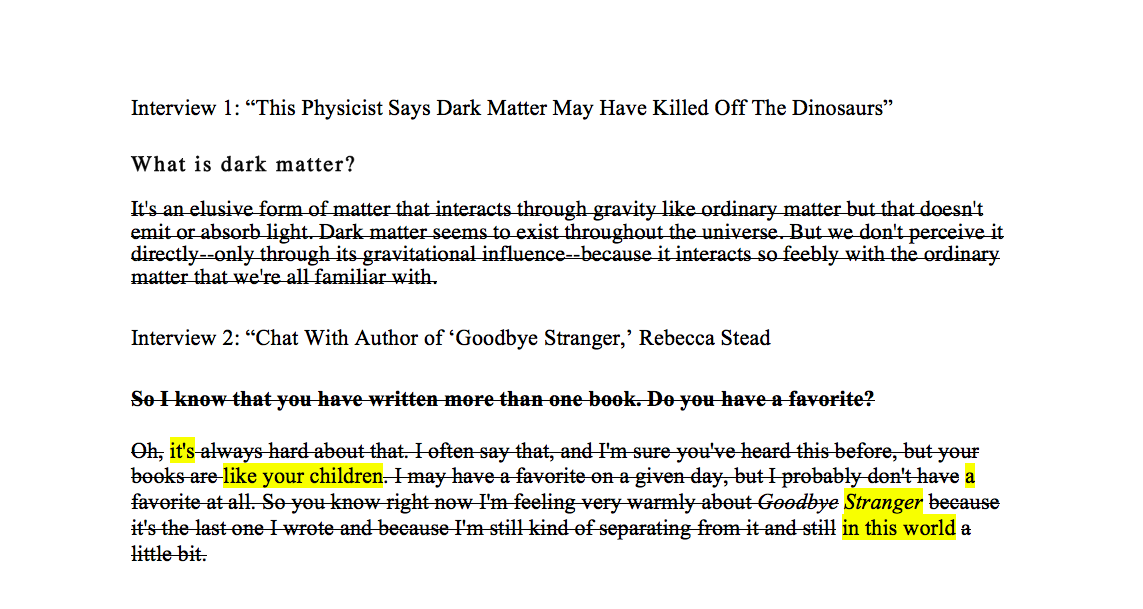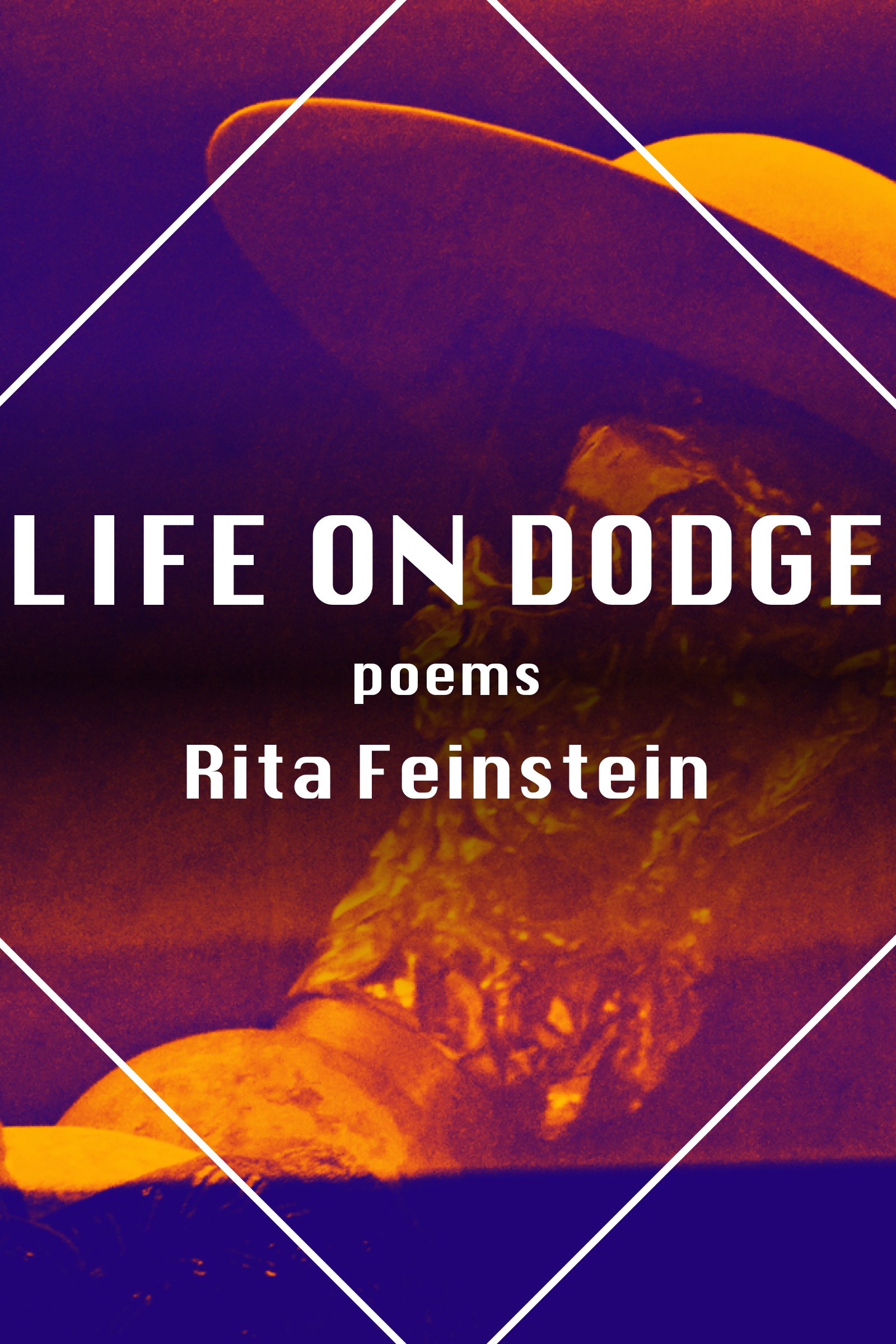Interview Erasure
Rita FeinsteinInterview Erasure
a poem for anyone who is bad at giving direct answers to questions
(1) Find two interviews on different topics. Let’s call them Interview One and Interview Two.
(2) Copy down only the questions from Interview One.
(3) Using only the responses from Interview Two, answer these questions. Instead of simply copying-and-pasting, approach each response as an erasure, extracting the words necessary to “answer” the questions. You may take as much or as little of the original text as you wish.
(4) You should go through the Q&A in order, using the first response from Interview Two to answer the first question in Interview One. And so on and so forth.
(5) The interview ends when you run out of questions or responses, e.g. if Interview One contains more questions than Interview Two does answers.

SAMPLE
What is dark matter?
It’s like your children. A stranger in this world.
Is dark matter made of atoms?
Well, it’s easier to fabricate something that small, true.
If it’s invisible, why call it “dark?”
I don’t. But other people do.
How can we tell dark matter exists?
People make us feel badly. Sometimes love is very boring.
Dark matter was first hypothesized many decades ago. Tell us about that.
I would like to see you more. I’d like to see a slightly less pretty you.
What is the current state of knowledge about dark matter?
There’s still time to fix things.
Do new findings about dark matter tell us anything about the origins of the universe?
There is this idea that matter—it’s complicated.
How about the existence of multiple universes—the so-called multiverse?
It was a challenging space but a safe space. Now, it’s very very different. Your problems follow you home.
Speaking of your book, what is the connection between dark matter and the dinosaurs?
It’s like this wave of feeling connected to people. “This must be it.” In my experience, it doesn’t work in that way. This world is, I think, moments of doubt.
If dark matter might explain the demise of the dinosaurs, might it also explain how life on Earth got its start?
I mean, I’m not really part of the process.
So if dark matter can send dangerous comets and asteroids our way, should we be worried?
Sometimes I think maybe.
Sources
“This Physicist Says Dark Matter May Have Killed Off the Dinosaurs”
About Life on Dodge
Life on Dodge is a generous gift to the broken-hearted, a romp through an interstellar garden with the best of guides. —Kiki Petrosino, author of Witch Wife
I realize that being a woman is a lot / like being a planet—I can’t decide / what my gravity attracts. I am as helpless / as I am powerful.
Poet Rita Feinstein builds a planet from twenty-five sonnets of lost love, and the astrophysics is undeniable. What has more gravitational pull than loss? What is a more alien landscape than the rearrangement of a heart?
A strong narrative arc built from verse, Feinstein’s debut collection crosses Shakespeare with science fiction to launch readers into a world apart where a newly broken heart is celebrated, examined, nurtured, and let to rage, as if only the atmosphere of an entirely new planet is able to bear the process of healing. This emotionally generous collection looks at pain and love—fourteen crystalline and confessional lines at a time. Dodge, as the speaker names her planet, “is not Virginia.” It is “red because a horse heart / is red . . . Red because / that’s what I was wearing when I left,” and as the speaker fills Planet Dodge with men (because “there’s no reason for Dodge / to be this empty”), she finds “how easy it is to hate them all / after six years of loving you too much.”
Life on Dodge is a powerful cycle of confessional verse, a contemporary radio signal to Plath and Sexton, utterly unafraid of the heat and danger of reentry after the fully interstellar escape that comes after heartbreak. “Next month the pain will be less, / and the next month it will simply disappear. / For example: today you are coming to Dodge. / You are coming to take me home.”
A Selection from Life on Dodge
When you left, there was a sound
like the scraping of a dagger
being unsheathed from my heart,
and in the left-behind hollow,
a red bat came to roost.
Good, I thought, because bats go
where moths go and moths go
where the light is, which means
there’s still something like a streetlamp
in me, however dusty and guttering.
But where its corona bleeds to black,
you can still hear it—the sleek shriek
of steel against bone, the infinite echo
of you pulling away.

BMP Celebrates National Poetry Month — Break Poetry Open
For this year’s National Poetry Month, Brain Mill Press & Voices want to add to your #TBR pile, sing siren songs of unsung heroes, and signal boost living poets we should be reading more. By the end of the month, we hope you will have acquired 30+ new books of poetry and that they continue to multiply in the darkness of your library. Explore new voices & new forms — re-read some old favorites — play if you liked this poet, you’ll like... the old-fashioned way, algorithm-free — just poetry lovers talking to poetry lovers, as the Universe intended. Happy #NaPoMo2019 from Brain Mill Press.


